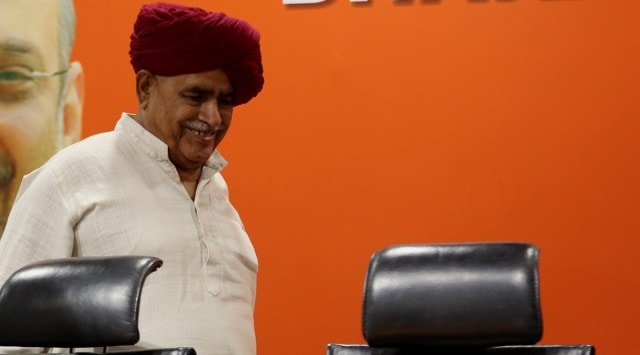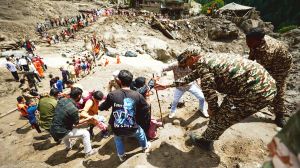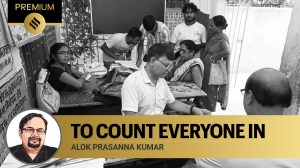Kirori Singh Bainsla: From an English teacher to Army jawan and PoW, to the leader of Gujjar quota agitation
In 2008, Bainsla had led a massive agitation for classification of the Gujjar community as Scheduled Tribes.
 Gujjar Leader Kirori Singh Bainsla. (Express Archive)
Gujjar Leader Kirori Singh Bainsla. (Express Archive)From an English teacher to a Prisoner of War (PoW) to one of the tallest Gujjar leaders, Kirori Singh Bainsla, who was the architect of the Gujjar reservation agitation in Rajasthan, passed away in Jaipur on Thursday morning after a prolonged illness. He was 82.
Bainsla’s son Vijay told The Indian Express, “He asked us for some water at around 5.30 am and went to sleep. He didn’t wake up following that. We tried cardiopulmonary resuscitation (CPR) and even took him to a hospital where he was (declared) brought dead.”
Bainsla is survived by three sons and a daughter. His funeral will take place on Friday at his native Moondiya village in Karauli in eastern Rajasthan, family sources said.
Born on September 12, 1939, at Moondiya, Bainsla started his career as a middle school teacher in Karauli and was soon promoted to the position of an English teacher at a secondary school. Decades later, his fluency in English and Hindi came in handy when he spearheaded the Gujjar quota stir.
Just In: Gujjar reservation agitation leader Kirori Singh Bainsla passes away.@IndianExpress pic.twitter.com/V08L6w2I9e
— Hamza Khan (@Hamzwa) March 31, 2022
https://platform.twitter.com/widgets.js
Bainsla joined the army in his early 20s as a jawan. He was part of it in the war against China in 1962 as well as the wars against Pakistan in 1965 and 1971. He was a PoW in the 1965 war. He retired as a Lieutenant Colonel in 1994. He then returned to his native village and started harbouring political ambitions. He contested panchayat elections in 1996 but lost.
His wife Resham Devi contested the panchayat poll in 2001 and won. He then contested the Zilla Parishad election as a BJP candidate, but lost again.
While Gujjars had been seeking reservation in jobs and education through their inclusion in the Scheduled Tribes (STs) category since at least the mid-1970s, this gained traction in the run-up to the 2003 Rajasthan Assembly elections. During her ‘Parivartan Yatra’ then, BJP leader Vasundhara Raje, on June 18, 2003, made a commitment to Gujjars for their inclusion in the STs list, if voted to power.
“Back then, Raje propped up Gujjar leader Ram Gopal Guard,” says Himmat Singh Gujjar, says an ex-close aide of Bainsla, who parted ways with him in 2019. Raje became the CM and when the commitment was not honoured, the Gujjar Mahasabha led by Ram Gopal, who was also a BJP leader, sat on a protest in 2005 to “remind BJP” about its commitment.
“Eventually, there was anger in the community and opposition to Ram Gopal’s leadership, and in March 2006, we decided to form Rajasthan Gujjar Arakshan Sangharsh Samiti under the leadership of Col. Bainsla,” says Himmat, adding that Bainsla was chosen “since he was an army man and people generally respect army persons since they are considered upright”.
As talks with the government over their demand yielded no results and frustration grew, Gujjars organised a day-long protest in Hindon on September 3, 2006, under Bainsla’s leadership. “The response was so good that even Gujjar leaders were taken by surprise,” noted PUCL leader Kavita Srivastava in a report.
For the first time, Gujjar protesters had uprooted railway tracks, which made headlines, forcing the government to again engage with their leaders.
However, with their talks making no headway, Gujjars started gearing up for another round of agitation by the end of May 2007. As police tried to prevent them from squatting on the highways, violence ensued in which 38 people were killed. The protest soon ended after the government gave them assurance of reservation under the Special Backward Classes (SBC) category, which remained unfulfilled.
In May 2008, Gujjar protesters laid siege to railway tracks again, which became more violent leading to the deaths of 42 persons.
That year, the Raje government granted 5 per cent reservation to Gujjars in the SBC category, while giving another 14 per cent quota to the Economically Backward Classes (EBC). But that breached the Supreme Court-stipulated 50 per cent quota ceiling, leading to a legal challenge and a stay on its implementation.
Dismayed over protests and talks not leading to any breakthrough, Bainsla sought to take up the issue “as a politician”. He joined the BJP in 2009 and contested the Lok Sabha election from Tonk-Sawai Madhopur seat, but lost to his Congress rival by a mere 317 votes.
However, “there was resentment within the community over Bainsla joining the BJP, since Gujjars had died under the BJP government, and he was removed from the Sangharsh Samiti,” says Himmat. “He apologised to the community in 2010 and again joined the committee.”
The Ashok Gehlot-led Congress government then extended one per cent reservation to Gujjars in the SBC category within the 50 per cent qupta cap. However, the Gujjars protested again in December 2010. In January 2011, the government accepted some of their demands, including implementation of Devnarayan Yojana across the state, some facilities for them on par with STs, and compensation and jobs to kin of those who had died in protests.
While Bainsla had grabbed national headlines in 2007-08, Himmat says it was the 2010-11 developments which lent credibility to the former and cemented his status as one of the tallest leaders of the community.
Then in 2012, the OBC Commission recommended that Gujjars and some other communities should be included among the SBC. The Gehlot government instructed the personnel department to amend the service rules to introduce the additional 5 per cent reservation, but the order was stayed by the High Court in January 2013, as it would have taken total reservation to 54 per cent.
The Raje government (2013-18) then passed two Bills, extending reservation to Gujjars, but both were stayed by the High Courts for crossing the 50 per cent ceiling.
Then in 2019, Bainsla-led Gujjar protesters again laid a siege to railway tracks, prompting the Rajasthan Assembly to unanimously pass a Bill extending five per cent reservation to five communities, including Gujjars, in educational institutions and government jobs under the More Backward Classes (MBC) category. This time, the Gehlot government cited the Centre’s constitutional amendment to exceed the quota ceiling to provide 10 per cent reservation to the EWS in the general category.
Bainsla and his son Vijay joined the BJP in 2019, causing rifts within the committee, with Himmat and other Gujjar community leaders parting ways with the Bainsla faction.
In November 2020, hoping to pass on his mantle to his son, Bainsla organised what was perhaps his last major protest. Speaking briefly to journalists then, he had said, “Ab toh Vijay he jaane (It is all up to Vijay now)”.
Lok Sabha Speaker Om Birla, Rajasthan Governor Kalraj Mishra, CM Gehlot and former CM Raje, among other leaders, expressed their condolences over Bainsla’s demise.
In his condolence message, Birla tweeted, “Condolences on the demise of Colonel Kirori Singh Bainsla ji, a strong leader of the social movement. He fought lifelong for social rights. May the departed soul rest in peace, my condolences to the family and supporters. Om Shanti.”
CM Gehlot said Bainsla fought a long struggle for the reservation of the most backward classes. “The news of the death of Colonel Kirori Singh Bainsla is very sad. As the head of the Gurjar reservation movement, Bainsla sahib fought a long struggle for the reservation of MBC. If the MBC class got a reservation today and if the credit goes to any one person, it is Col. Bainsla,” he said.
Condoling Bainsla’s death, Raje said, “Colonel Saheb always fought for the society and played an important role in advancing the issues of social interest. His invaluable contribution in the field of public service and politics will always be remembered.”







